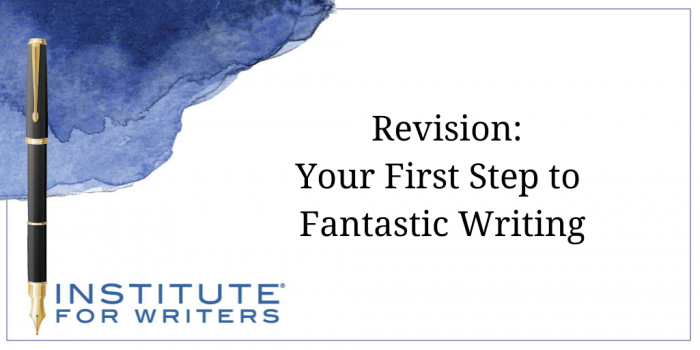1000 N. West Street #1200, Wilmington, DE 19801
© 2024 Direct Learning Systems, Inc. All rights reserved.
Beginning Tuesday, July 22, 2025 at 10 PM CT through Wednesday, July 23, 2025 at 4 AM CT, we will be performing scheduled maintenance to update our website.

We teach our students how to write and get published!
View our Course Catalog >
“Wait … what do you mean I’m not done?!” I hear this so much from new writers when I mention revision. I swear, revision is like a four-letter word to them! It’s a harsh reality to run up against … like tripping on a loose shoelace and landing, smack, on your face in a nest of fire ants.
As an editor, it’s often my responsibility to break it to folks that the real work associated with writing—the revision phase—is only now about to begin, just when they thought they were finished.
Revision … it’s a necessary part of the writing process. But how do you go about doing it?
There are about as many methods of revision as there are writers. Everyone, it seems, has a different way of tackling the revision process.
I particularly espouse the “read your work aloud” advice. Heck, I embrace this through the entire writing process! There’s nothing like hearing your words spoken aloud to make you either nod in approval or cringe in dismay. A lot of the time, listening to the words you’ve written reveals rough spots more readily than simply reading those words on a page or looking at them on your computer monitor. When read aloud, words have sound and flow, pacing and cadence. Granted, not all work is meant to be presented audibly, but it certainly doesn’t hurt to read your writing aloud during the revision phase.
A recent client submitted a memoir to me for editing. He was proud of himself—as well he should have been. He’d spent the better part of four months dredging up some of the most painful details of his life and setting them down on paper, ostensibly for the world to see.
But he’d included a lot of asides and real-time commentary that detracted from the story he’d worked so hard to tell. And since he had asked me for brutally honest feedback in my sample edit, I owed him that. Truthfully, I would have given it to him even if he hadn’t asked for it, but at least I knew he was bracing himself for the worst.
And I delivered it.
But I wasn’t brutal about it. That’s not how I work. Still, I was honest. And direct. I told him while the asides gave the reader an inside perspective of what his daily life was like—and they were, admittedly, amusing in places (and had been clearly set apart from the narrative by his use of italics), they took away from the impact of the story he was trying so hard to tell. It was roughly the literary equivalent of making the perfect one-gallon pot of chicken stock … and then diluting it with a half gallon of water. Sure, the flavor is basically still there, but it’s all watered down. And yeah, you’ve got fifty percent more—but it’s fifty percent more of a lesser-quality product. More isn’t always better.
He later told me my comment had really pissed him off. And because he was so angry over it, he refused to look at the returned sample edit for about three days. But when he did, he realized something: The passages I deleted made the resulting narrative stronger. And as he read through the five sample pages I edited, he discovered his intended thoughts flowed more smoothly when there weren’t all those interruptions.
One of my comments to him was that, as much as he might not want to hear it, his manuscript wasn’t ready for editing. It needed work. I recommended a few books to him—most notably Anne Lamott’s Bird By Bird: Some Instructions on Writing and Life.
I expected him to find the book and maybe give it a half-hearted glance.
Boy, was I surprised—and wrong!
He marched himself down to his local library that afternoon and took out several volumes about the art and craft of writing. Then he asked the librarian about Bird By Bird and, finding they didn’t have it at that location, asked her to get it from another branch. When it arrived, he read the book from cover to cover—and then attacked his poor manuscript like a lion enjoying an antelope on the Serengeti.
That client is an editor’s dream! He not only accepted that his writing needed work, but he accepted the professional advice he was given—and took decisive steps to act on it. The result was a more polished final product.
Never overlook the importance of revision in your own writing. It will make you a better writer in the long run.
Rita M. Reali is an award-winning author whose work has appeared in Reminisce magazine, the S.H.A.R.E. pregnancy-loss newsletter, and newspapers across Connecticut and Tennessee. She’s spoken about editing at writers’ conferences and delivered presentations on proofreading to several professional groups. Rita also runs an editing and proofreading business, The Persnickety Proofreader, and blogs under the same moniker: https://persnicketyproofreader.wordpress.com. Her debut novel, Diagnosis: Love, was published in 2015; she published her second novel, Glimpse of Emerald, in 2017.
1000 N. West Street #1200, Wilmington, DE 19801
© 2024 Direct Learning Systems, Inc. All rights reserved.
1000 N. West Street #1200, Wilmington, DE 19801
© 2024 Direct Learning Systems, Inc. All rights reserved.
1000 N. West Street #1200, Wilmington, DE 19801
© 2024 Direct Learning Systems, Inc. All rights reserved.
1000 N. West Street #1200, Wilmington, DE 19801
© 2025 Direct Learning Systems, Inc. All rights reserved.
1000 N. West Street #1200, Wilmington, DE 19801
©2025 Direct Learning Systems, Inc. All rights reserved. Privacy Policy.